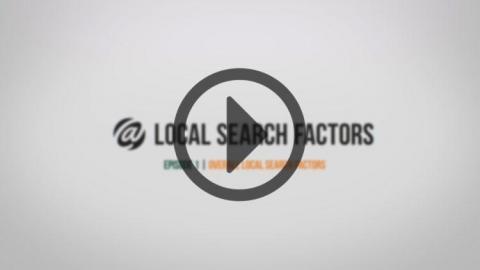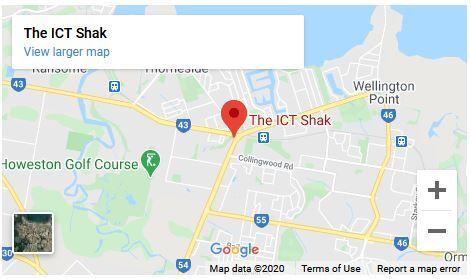Overall Local Search Factors
Welcome to the first video in this series on the topic of Local Search. In today’s video, I will describe the eight factors that SEO experts agree are the most important when optimising for organic local search. When ‘deciding’ which results to display, search engines receive ‘signals’ about your business from wherever your business is mentioned on the internet.
This could be based on your own website, from other websites, from local directories, from Google My Business, from Facebook, even from how your website appears on mobile! These signals vary in their ‘weighting’ (or importance) and the percentages next to each signal described below shows their relative importance according to research.
1. On Page Signals (20%)
Service – Location – Credibility
The first factor I am going to talk about is referred to as ‘On Page Signals’ and relates to your own website. It has the highest weighting of all, at just over 20%.
Search engines are programmed to assume that anyone seeking a local business needs to know three important factors about that business. What they do (service), where they are (location) and whether they provide a good service (credibility). The search engine algorithm seeks signals about these on your own website then compares these factors against your competition seeking to ‘recommend’ the best option to the searcher.
As such, it is very important that your website contains the following:
- Content – Your website must tell people what you do and where you are located
- Schema – Your website must use ‘schema mark-up’. This is a new type of coding that will define your business type, products and location. For example, there is a certain way of coding to indicate that you are a ‘small business’ so that this is recognised by the search engine. For more information, check out schema.org
- Testimonials/Reviews – Your website must contain testimonials/reviews that prove that your business is credible (you can use schema mark-up to improve the signals from these as well).
2. Link Signals (20%)
Back Link Credibility
Also weighted at 20%, link signals come from any other website that links to your website. The number of links and the types of links are the way a search engine measures your credibility. It is assumed that others will only ‘mention’ you and link to your website if you are good!
While generally the more links the better, not all links are of equal value. As I will discuss in another video ‘Negative Factors for Local Search’ some links will actually do more harm than good.
These five are the most important links to have:
- Google My Business (GMB) – All local businesses should have a listing in GMB. A verified GMB listing will help you rank well in local search. Note this is not the same as Google Plus
- Location Specific Links – Links from websites that are specific to your location will also help you to rank well. These include websites such as ‘What’s on in Redlands’ or ‘What’s on in Brisbane’.
- Citations – NAP (name, address and phone number) citations in local directories help to increase the total number of times your business is listed on the internet. You may have entered these yourself, or they may have been collected by ‘scraping tools’. It is very important that you find, claim and check these citations to make sure they are accurate and consistent. A consistent NAP means that the content (what is written) and format (how it is written) of your business name, address and phone number are exactly the same every time.
- Industry Specific Links – These are links relating to your specific industry. So, if your business is in the automotive industry and there is a website that talks about the automotive industry in general, a link from this website to your website will significantly increase your domain authority (or your credibility).
- Authority Sites – These are sites with high domain authority such as CNN, Channel 7 News or a .gov.au or local council site. A link to your website from one of these types of sites will also significantly increase your credibility.
3. Google My Business (15%)
- Verified – Google has announced that they will de-list unverified pages from GMB. Verification usually involves entering a code online that is posted to the street address of your business. If you haven’t already verified your page organise to do this immediately. If you need to create a GMB page, do that and organise verification at the same time.
- Correct Details – Make sure your GMB page has correct, up-to-date details. If you have moved since you verified your location, change your address on GMB and verify the new address.
- Consistent NAP – This is very important! A consistent NAP will increase your link signals, your ‘On Page Signals’ and your overall credibility online with all search engines.
4. External Link Signals (14%)
- NAP consistency => Website – Make sure that external links have a NAP consistent with your other citations and that there is a link back to your website. It is not enough for another website to simply mention your business name, it is important that your website address is also listed.
- Correct Details – Make sure that the information on external links is up-to-date and accurate. For example, you do not want a consistent NAP on an external website that says you sell a product that you do not sell. As well as creating confusion, people are likely to ‘bounce’ off your site quickly when they see that you don’t have what they are seeking.
5. Behavioural Signals (10%)
- Click through rate – This is a measure of how many people actually click on your website in the search results and also includes mobile ‘clicks to call’.
- Bounce rate – This is a measure of how long people stay on your website. The higher the bounce rate, the quicker the user "bounces" off the website.
These two measures work together. If you have a high click through rate but people ‘bounce’ out of your website quickly this will act to lower your rank in the search engine. This is because the search engine will ‘assume’ that your website is either not good or that you are not offering the service / product sought. This is a strong behavioural signal.
6. Personalisation (8%)
- User History – The individual user’s previous searches are remembered by the search engine and ‘bias’ the results shown to the user in subsequent searches. For example, if the user has searched for a specific builder in Wynnum in the past, a search for ‘builder Wynnum’ will prioritise the builder whose search results have been clicked on in the past.
- No Control – Obviously, you have no control over this particular factor!
7. Reviews (8%)
Although reviews are only weighted at 8%, the star rating that is generated from these reviews can have a significant effect on whether or not people will click on your listing in search results. The most important places to have reviews are:
- Third Party – On third party websites such as TrueLocal or SearchLocal
- Google My Business – GMB is an important place to have reviews
- Reviews on Website (schema) – On your own website "marked-up" according to the guidelines at schema.org
8. Social Signals (5%)
While social signals only make up 5% of signals used by search engines, they are still very important, not only because of local search ranking!
- Likes & Shares – The more people who like and share your content the better. Keep in mind, simply having a massive number of likes for your page but limited interaction (likes, comments, shares) from those people is not enough.
- Social Reviews – Reviews, assuming they are positive, on Facebook etc. is an excellent way to increase your credibility.
- Check-in’s – Check-in’s are a fantastic opportunity. Unfortunately, a lot of businesses don’t take advantage of them! Take every opportunity to encourage your customers to check-in online. Consider offering an incentive, such as a free coffee every 5 check-ins. Not only does the check-in improve your social signals, it also shows the friends of those who check-in that they like your business.
The subject of Local Search is very important for local businesses. Consider which of these eight factors your business needs to work on most. On the next video, I will talk about how to improve your organic local search.
We specialise in helping businesses with their local search engine optimisation
Find out how your business is ranking in your Local Area
![]() Local Search Rankings
Local Search Rankings![]() Local Listings
Local Listings![]() Reviews
Reviews![]() On-site Search Engine Optimisation
On-site Search Engine Optimisation![]() Social Media
Social Media



